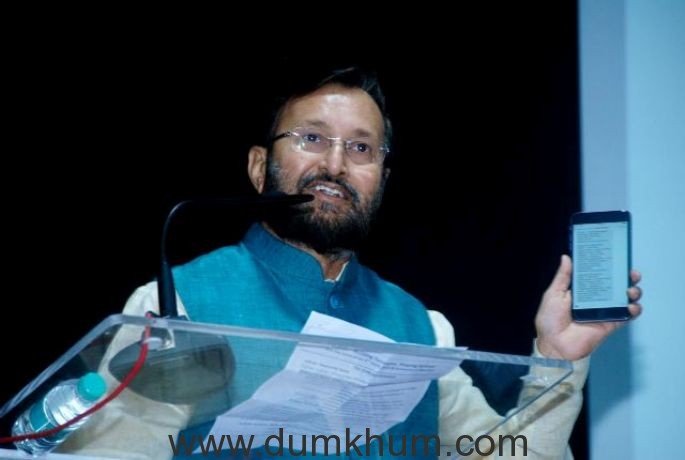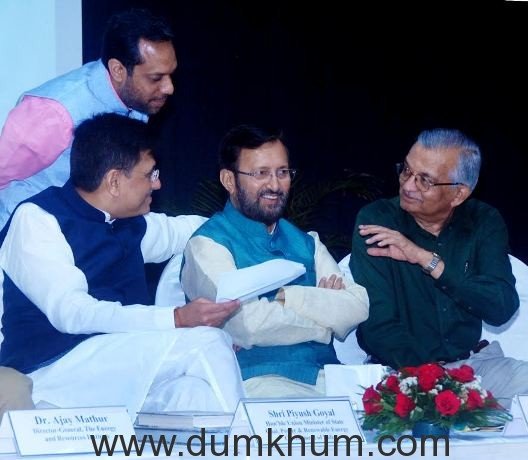India to ratify COP 21 Global Climate Agreement on April 22 – Prakash Javadekar
Reasserting India’s commitment to carbon emission reduction and sustainable development, Union Environment, Forests & Climate Change Minister Mr. Prakash Javadekar today said India, along with 100 other nations would ratify the COP 21 Global Climate Agreement on April 22. COP 21 would be ratified at a high level signing ceremony to be convened at the UN Headquarters in New York. The agreement, negotiated in Paris in December 2015, sets out a global action plan to put the world on track by limiting global warming below 2 degree Celsius.
Speaking at a Symposium “COP 21 – Building Synergies, Shaping Actions” organized in the University of Mumbai, Mr Prakash Javadekar said “all countries have decided to walk the green path as per their common but differentiated responsibilities”. He described the Paris agreement as a victory of multilateralism and the one which helped correct image perception of India. “India was always perceived to be a naysayer and negative in its approach and took a corner seat in most of the international conferences. But in Paris, Prime Minister Narendra Modi introduced the concept of climate justice driving home the message of sustainable development”
Mr. Javadekar said climate change was a reality with 1 degree rise in temperature caused by 150 years of uncontrolled carbon emission by the developed world. He said while 30% of cumulative contribution was that of the United States, 50% by Europe, Canada and other developed world and 10% by China, India was responsible for only 3% carbon emission. The Minister further said “though India is not part of the problem, it wants to be part of the solution. Our commitment is reflected in every programme being pursued by the Government” .
He said India had taken pro-active measures to discourage use of fossil fuels in a bid to reduce carbon foot print by levying Rs 400 per tonne green cess on coal. “If the developed world followed India’s example and levied higher taxes on coal, billions of dollars would accrue to pursue clean energy programmes” he added.
Mr Javadekar said the proposed Compensatory Afforestation Funds Bill 2015, would unlock Rs 40,000 crores of funds for the ‘Green India’ initiative. The Bill, which was referred to a Parliamentary Standing Committee is likely to be passed in the second half of the budget session. Under CAF, funds would be made available to states to take up afforestation programmes, and to increase density of existing forests to substantially boost tree cover in the country.
The Minister also listed out plans to control vehicular pollution by moving to Bharat VI emission norms, policies on waste management, Swachch Bharat initiative, Ganga rejuvenation etc as other measures aimed at sustainable development and containing climate change.
Union Minister for Coal, Power, New & Renewable Energy, Mr Piyush Goyal said his portfolios put him in an awkward situation. “I am a polluter as well as a pollution container”, he said.
Mr. Goyal said India has launched the world’s largest renewable energy programme by scaling up the target for solar energy “The solar energy mission envisaged 20,000 Mw of solar electricity generation by 2022. But this target has been pushed ahead by the Prime Minister to 1,00,000 Mw (1Gw)” Mr. Goyal said his Ministry has already bid out 19,000 Mw of solar energy projects and the installed capacity of 20,000 Mw would be achieved as early as 2017. He however cautioned that all renewable energy programmes will be sustainable only if they become economically viable.
Mr. Goyal said coal, which is available in abundance in India, has its own place in ensuring cheaper energy. “While one is aware of pollution caused by the thermal power plants, their importance can not be overlooked. Therefore, our thrust is on adopting clean coal technologies” he added.
The Energy Minister lamented lack of commitment of the developed world in fulfilling their obligations. He however asserted that “India’s green energy programmes will be carried out whether we receive support of the western world or not”.
Former Chairman, Atomic Energy Commission, Dr Anil Kakodkar, Vice Chancellor of the Mumbai University Dr. Sanjay Deshmukh, DG, TERI, Dr. Ajay Mathur were also present.
PIB Mum | STupe/ AS/ (MD) – 02













